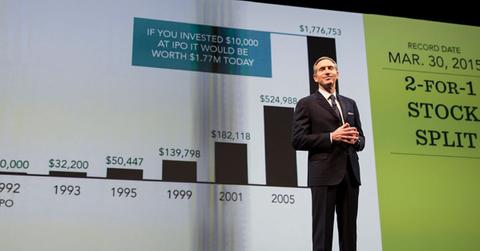Why Stocks Split and How It Benefits a Company, Explained
Companies might do a stock split to increase liquidity and appeal to more retail investors. Keep reading to learn how stock splits benefit companies.
April 30 2021, Published 1:33 p.m. ET

The pricing of stocks on the stock market can impact investors’ decisions of whether to invest in those companies. In order to accommodate more investors who might be more comfortable buying stocks within lower price ranges, a company might opt to split its shares.
A stock split occurs when a company deems its price too high for the average investor and wants to increase its liquidity. This is common when companies experience a surge in stock prices and they want to reduce prices to a more popular price for trading.
Amazon stock split rumors
Companies might decide to undergo a stock split in order to become more attractive to a greater number of investors, even if only temporarily. There are speculations about Amazon potentially splitting stock in order to enable the e-commerce giant to be included in the Dow Jones Industrial Average.

How a stock split works
A stock split is a way for a company to boost liquidity by dividing existing shares of stock into multiple shares. The most common stock splits are 2-for-1 or 3-for-1. In a 2-for-1 split, each share of a company’s stock would now equal two shares. In a 3-for-1 split, each share would now equal three shares.
Splitting stock doesn’t impact the total value of stocks for any shareholder. It only multiplies the number of shares they own. A shareholder of 100 shares would now own 200 shares after a 2-for-1 split, worth the same as they were pre-split.
In other circumstances, companies might do a reverse stock split. The number of shares outstanding decreases and the price per share increases.
Reasons for a stock split
When a company's stock rises significantly, a split makes it easier for investors to get a certain number of shares. (For example, a board lot is usually 100 shares, and it’s an easier amount to trade than a random smaller share number.)
Another reason is that a higher number of outstanding shares can offer more liquidity and reduce the bid-ask spread. In general, this makes trading easier for more investors.
Technically, a split doesn’t increase a stock’s price, but it can spark interest in a company and temporarily spiking the price. Yahoo Finance noted, “Stocks have historically outperformed the market right after a split announcement.”

Will Amazon split stock?
An Amazon stock split would enable more investors to buy shares of the company since each share would be at a lower price. Currently, Amazon stock is trading at over $3,500 per share on the Nasdaq. If Amazon were to do a 10-for-1 split, the per-share price would be divided by 10 to approximately $350 apiece.
In the Dow, stocks are weighted by price, not just market cap. If Amazon were to reduce its per-share price through a massive stock split, it would be within range of inclusion in the Dow. Dropping the stock price might draw more retail investors, who care more about the price than institutional investors do.
Keith Lerner, the chief market strategist at Truist Advisory Services, said that being in the Dow is largely “symbolic” and demonstrates your leadership in the industry, according to Yahoo Finance.
